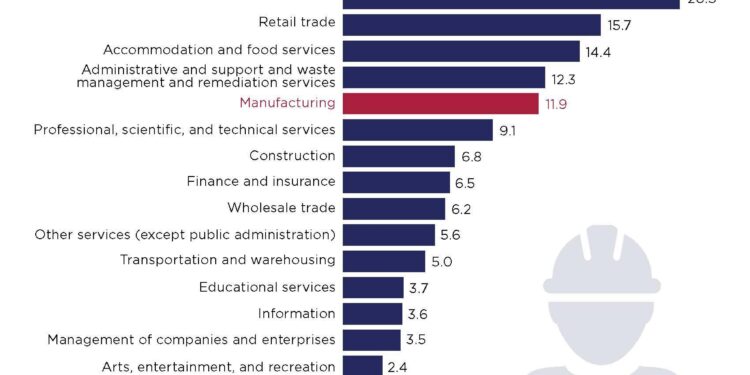U.S. employers are significantly scaling back hiring as the Trump administration pushes forward with an aggressive trade agenda, raising concerns about the potential impact on the nation’s economic growth. According to recent data and expert analysis, companies are adopting a cautious approach amid escalating tariffs and trade tensions, which threaten to disrupt supply chains and increase costs. This shift in hiring patterns underscores the broader uncertainties facing the labor market as trade policies become a central factor influencing business decisions across multiple industries.
US Employers Pull Back Hiring Amid Rising Trade Tensions
US businesses are responding cautiously to an increasingly volatile global trade environment, marked by newly imposed tariffs and escalating disputes. Industries that once signaled robust growth are now revising their projections downward, citing uncertainty and potential cost increases. Several sectors-including manufacturing, agriculture, and technology-have reduced their recruitment plans, reflecting concerns over disrupted supply chains and strained international partnerships. Employment data from recent weeks reveals a noticeable slowdown in hiring activity, especially in export-dependent regions.
According to industry insiders, companies are prioritizing operational stability over expansion, focusing on preserving cash flow and reassessing workforce needs. The ripple effects of tightened trade policies include:
- Heightened production costs due to tariffs on imported materials
- Delayed investment decisions amid market unpredictability
- Downscaled plans for new hires and temporary contract workers
| Sector | Hiring Outlook | Key Challenges |
|---|---|---|
| Manufacturing | Moderate decline | Raw material tariffs |
| Agriculture | Significant pullback | Export restrictions |
| Technology | Slowed growth | Supply chain delays |
Impact of Tariffs and Trade Policies on Domestic Job Market
The escalation of tariffs under the current administration has prompted a significant pullback in hiring among U.S. employers, particularly in manufacturing and export-reliant industries. Restrictions and increased costs imposed on imported goods have led many companies to delay expansion plans or reduce workforce growth, as uncertainty surrounding international trade deals continues to cloud future prospects. Key sectors including automotive, agriculture, and technology are experiencing hiring freezes or layoffs due to rising input expenses and retaliatory tariffs from trade partners.
The ripple effects extend beyond blue-collar positions, impacting white-collar roles tied to supply chain management, finance, and product development. Industry analysts highlight several core impacts:
- Increased production costs forcing companies to restructure operations domestically
- Supply chain disruptions leading to longer lead times and reduced competitiveness
- Heightened market volatility causing cautious hiring strategies across sectors
| Industry | Hiring Change (%) | Reported Challenges |
|---|---|---|
| Automotive | -15% | Tariff-driven supply shortages |
| Agriculture | -10% | Retaliatory tariffs limiting exports |
| Technology | -8% | Component cost inflation |
Strategies for Businesses to Navigate Uncertainty and Sustain Growth
In an environment marked by geopolitical tensions and rapidly shifting trade policies, businesses must sharpen their agility to remain competitive. Companies are increasingly adopting diversified supply chains to mitigate the risks associated with sudden tariff impositions and trade barriers. Moreover, staying informed through real-time data analytics allows decision-makers to anticipate market fluctuations and adjust their strategies accordingly. Investing in workforce upskilling and automation also enables firms to maintain productivity despite hiring slowdowns, ensuring operational resilience during uncertain periods.
Financial prudence becomes indispensable as firms navigate these choppy waters. Implementing rigorous expense management and developing flexible budgeting frameworks can cushion the impact of sudden revenue dips. Below is a simplified overview of strategic focus areas that can enhance business sustainability amidst ongoing trade challenges:
| Strategy | Key Benefit | Example Application |
|---|---|---|
| Diversify Suppliers | Reduces dependency risks | Source components from multiple countries |
| Embrace Automation | Maintains output with fewer hires | Integrate AI-driven manufacturing robots |
| Flexible Budgeting | Adjusts spending dynamically | Monthly budget reviews aligned with trade news |
| Continuous Training | Enhances workforce adaptability | Online skill development programs |
In Conclusion
As the Trump administration continues to implement stringent trade policies, U.S. employers are responding with caution, reflected in a notable reduction in hiring across multiple sectors. This shift underscores the broader economic uncertainty fueled by escalating tariffs and trade tensions. Moving forward, analysts will be closely monitoring how these measures impact the domestic labor market and overall economic growth in the months ahead.










